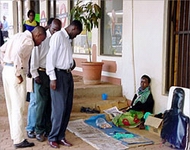Idi Amin buried in Jeddah
Former Ugandan despot Idi Amin has been buried in the Saudi Arabian city of Jeddah, his son said.

Ali Amin rejected reports that the family had asked the Ugandan government to bring the body back to the central African state.
“We have not asked anything from the government and take it from me that my father has been buried in Jeddah,” Amin told AFP news agency on Saturday.
The former Ugandan dictator Idi Amin died earlier in the day in a hospital in Jeddah, Saudi Arabia. Thought to be 79 years old, Amin had been suffering from a kidney ailment for several years but refused treatment for the condition.
His health had been deteriorating and he went into a coma three weeks ago, Saudi hospital sources said.
Orgy of slaughter
Amin ruled Uganda in an eight-year orgy of slaughter and lunatic brutality that claimed hundreds of thousands of lives.
He did much to stain the continent with a reputation for bloodshed and backwardness, killing more than 300,000 political rivals and ordinary Ugandans and destroying the country’s economy.
However, Ugandans old enough to remember the brutality of Idi Amin’s reign in the 1970s reacted with sympathy on to the news that the former dictator lay on his death bed.
“We are aggrieved but we forgive. If anybody does not forgive this, it is a recipe for more confusion in the country,” said Henry Mayega of the United People’s Congress.
|
One of the most appalling reigns of terror, Amin is known to have kept the decapitated heads of political opponents in his refrigerator. |
And Nakato Naboosa, a 54-year-old female newspaper vendor in Kampala, said: “We are taught every day about forgiveness and reconciliation. Amin should just be accorded that.”
But many would have liked to have seen the former dictator stand trial for his excesses.
Big Daddy
As armed forces chief, Amin staged a coup in 1971 when President Milton Obote was out of the country and proclaimed himself head of state.
Big Daddy, as he became known, began by slaughtering Obote loyalists, but the killing quickly spread from the barracks to the entire country.
It was one of the most appalling reigns of terror anywhere, with Amin reputed to have fed the remains of victims to crocodiles and kept the heads of decapitated political rivals in his refrigerator.
Amin also drove out of the country about 80,000 Ugandans of Asian origin, saying God had commanded him to do so in a dream.
He distributed their vast businesses to his cronies, who mismanaged them, leading to an economic meltdown.
Because of Oboto’s pro-communist leanings, many in the West, including former colonial power Britain, at first embraced Amin’s putsch and suspicions about foreign involvement linger to this day.
 |
|
Residents of Kampala, Uganda |
Amin’s reputation as a buffoonish butcher did not prevent him from strutting on the international stage bedecked with medals.
He once addressed the UN General Assembly in the local Lugandan tongue rather than in English, which he said was the language of colonialists.
Among the many titles he conferred on himself was that of Conqueror of the British Empire, as well as a doctorate of law, declaring himself a field marshal and, in 1975, life president of Uganda.
At the height of his reign, fellow African leaders overlooked his blood-drenched rule and praised his anti-imperialism.
The one leader prepared to stand up to Amin was President Julius Nyerere of neighbouring Tanzania.
In 1978, Amin made the mistake of invading Tanzania.
Nyerere counter-attacked with a force of Tanzanian troops and Ugandan exiles, culminating in the capture of Kampala after seven months, forcing Amin to flee in April 1979.
Unclear birthdate
Amin was born in either 1924 or 1925 into the Muslim Kakwa tribe in Koboko in northwest Uganda.
In 1946 he joined the King’s African Rifles of the British colonial army, and being both big and a good sportsman – he held the title of Ugandan heavyweight boxing champion from 1951 to 1960 – he attracted attention among his superiors.
He was notorious for brutality and torture during the suppression of the Mau Mau rebellion in Kenya from 1952 to 1956, but he was rewarded with promotion rather than prosecution.
Amin was thus a member of the ruling elite that moved into positions of power when independence was declared, first as a crony of Obote and then as his sworn rival.
Leaving his country in economic ruins, Amin first sought refuge in Libya and then in Saudi Arabia, where he lived in luxury with several wives and some of his estimated 50 children.